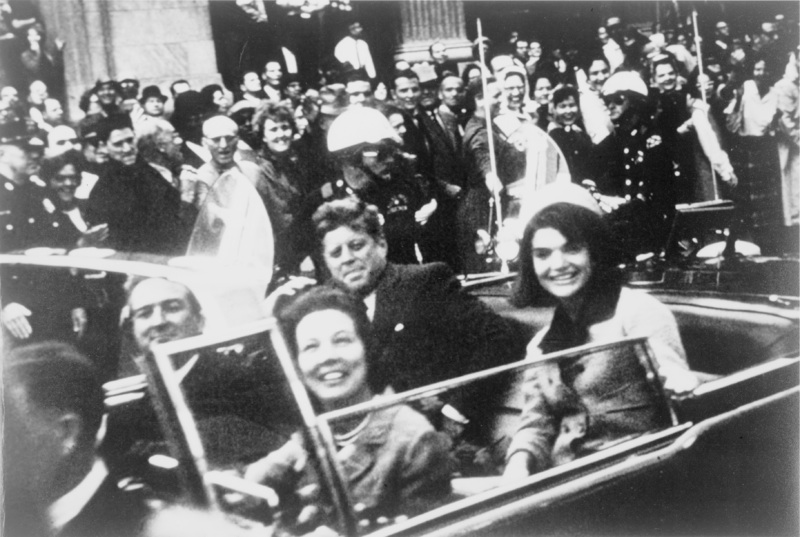Where Were You When Kennedy Was Shot on November 22, 1963?

On the 50th anniversary of the death of President John F. Kennedy in Dallas, a look back.
The following account was written by Dan Rattiner as part of a chapter for a new book he has in manuscript form to be called TRIUMPH TR-3. Printed with permission.
11/22/63
After successfully completing my first year of graduate school in architecture at Harvard, my professors said they thought it might be best to take that new fall semester off and work beginning in September on a construction site to learn more about the nuts and bolts of how things are put together. It would just be one semester. I could return to grad school in the spring. They got me this job with the Fuller Construction Company, probably the largest construction company in Boston at that time, working a job building an apartment house on a hillside in Milton, Massachusetts about 45 minutes by motor scooter from Cambridge.
This was to be an eight-story apartment building. I bought work boots and checkered shirts and sweatshirts. The company gave me a hardhat.
In many ways, this was a wonderful job. It was hard work. We worked through rainstorms, through heat waves. My work took place in the little construction shack at the back of the property, going over plans and the day-to-day schedules marking off the arrival and counting the numbers of all the new materials to make sure what we were getting is what we had ordered. The job was called “Clerk of the Works.”
Across the street was the Baker’s Chocolate Factory, and when the wind was right, our work site smelled just wonderful. I recall one very rainy day when the coffee truck came slipping and sliding up the muddy track to the foundation we were building, and we all took a coffee break. It seemed to me, and I mentioned it at the time to some of the others standing alongside that truck, that this was just about the best cup of coffee I had ever drunk. We were a dirty group of people, all sweaty and mud covered, the rain pouring off our helmets and coats, and as we held these cardboard cups of hot coffee, the smell of it mixed up with the smells of wet concrete behind us and chocolate from across the way.
Mick, a little tough guy about five-five, was the foreman who ran the site. Everyone’s hard hats were metal. His was brass. An architect in a windbreaker came a few days a week from time to time to go over things. I tried to learn things from him.
On a Friday in November about 3 in the afternoon, the architect arrived and spread out the plans in the shack with me. I went out and back down to the site for a while—we had completed the basement and were now working on the first floor, and I helped out Mick. About ten minutes later, the architect appeared, walking crookedly down the hill from the shack, holding the portable telephone to his ear and weeping uncontrollably.
“Oh no,” he was shouting. “It can’t be!”
I stopped what I was doing. We all did. My first thought was that somebody in his family had been in a terrible accident. What was it? Mick and one of the others started toward him, but they’d taken no more than two steps when he stopped them with a vicious shriek.
“The President has been shot!” He shouted. “He’s dead. He’s dead.”
“The President is in Dallas,” somebody said.
“He’s not in Dallas,” somebody else said.
“He’s shot in Dallas,” the architect screamed, still holding the phone. “He was with Jackie. Oh no, oh no.”
Reactions among the workmen varied. Some just started crying along with the architect. Others were in shock and just stood still with their mouths open. Still others were angry. Over it all was a sense of disbelief.
“I just saw him on Saturday!” I shouted. “He was here, at the Harvard-Columbia game. Not in Dallas. He was 20 rows behind us. We’d turn and look up at him. He was surrounded by security men.”
The entire crew was falling into chaos. When had this happened? Three hours ago? Why hadn’t anybody called us? We’d been working three hours without this knowledge? Johnson did it. It was Johnson, he’s from Dallas.
Mick turned to face us. “No more work today,” he said. “Go home. I’m going home.” He then turned away.
I trudged up the construction site, got on my scooter at the shack, and headed down the hill and through the small downtown of Milton. For the next half hour, I drove past cars bumper-to-bumper in traffic jams, the people inside the cars side-by-side in their two lanes, shouting at one another, honking their horns in anger, and then shouting and cursing at me as my Lambretta buzzed along carefully through the slots between the lanes, so fearful I would fall or be accosted as I short-cutted my way back to Cambridge. They’d never cursed at me before when I’d run the slots. Now, they’d see me coming along the white lane lines in their rear views, wave a fist out the window, and then whatever else they said I couldn’t hear because I was down the way and gone.
I was very concerned I would not make it home. But I did.
Back at the apartment, I found both Tom and Bill seated in stony silence in our little living room/ single bedroom, watching everything going on on our little black-and-white TV. I pulled up a stool and joined them, and that, with a few breaks for food or drink, is what we watched for the rest of the day, into the night, and all the way to dawn.



